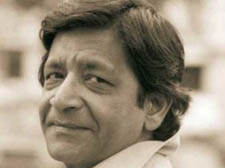|
|
 |
| |
 VS Naipaul VS Naipaul |
The shadow boxing Naipaul refuses to pulls any punches
order this book
IN his new book, A Writer’s People: Ways of Looking and Feeling – an unlikely potboiler – Nobel prize-winning novelist and non-fiction writer VS Naipaul is still settling old scores, including the sense of belonging that has always eluded him since he was born in Trinidad in 1932.
He is also continuing his spat with novelist Anthony Powell, author of the 12-volume autobiographical sequence, A Dance to the Music of Time, that is at present being serialised on BBC Radio 4.
Sir Vidia doesn’t pull his punches: “I read six connected books from the middle. I was appalled. There was no narrative skill, perhaps even no thought for narrative. Some emotional charge is missing. What is the point? Perhaps there is no point apart from the display of social knowledge.”
So much for all Powell’s claims to fame compared to the one writer Sir Vidia feels can do no wrong – the French short story writer Guy de Maupassant.
The master of the snide remark dismisses the reputations of those unfortunate beings for whom he has no further use in less time than it takes to kill a fly.
In his 376-page book about their 30-year friendship “across five continents” (Sir Vidia’s Shadow, Hamish Hamilton I998), the American novelist Paul Theroux quotes his ex-mentor as saying: “Literature is for the old, the experienced, the wounded, the damaged, who read literature to find echoes of their own experience and balm of a certain sort.”
In other words, readers must be similar to him to have any value.
When Vidia abruptly terminates their friendship on page 376, Theroux is more than ready to move on from the man who has constantly brutalised himself, and everybody with whom he has had any dealings: “Watching Vidia scuttle up the road towards Hyde Park, I noticed something amazing,” he writes. “On this bright day in April, the sun slanting into Gloucester Road, Vidia was very small, and shrinking fast, and it was as if he would vanish before he reached Kensington Road – so tiny, indeed, he cast no shadow.
“Without a shadow he seemed even smaller than he was, and darker, as though he had no substance. As though he were the shadow.”
Carl Jung, the Swiss psychiatrist, confirms Theroux’s insights on the shadow in his writings, as does the American poet Robert Bly in A Little Book on the Human Shadow.
JOHN HORDER |
 |
|
 |
 |
|
 |
|